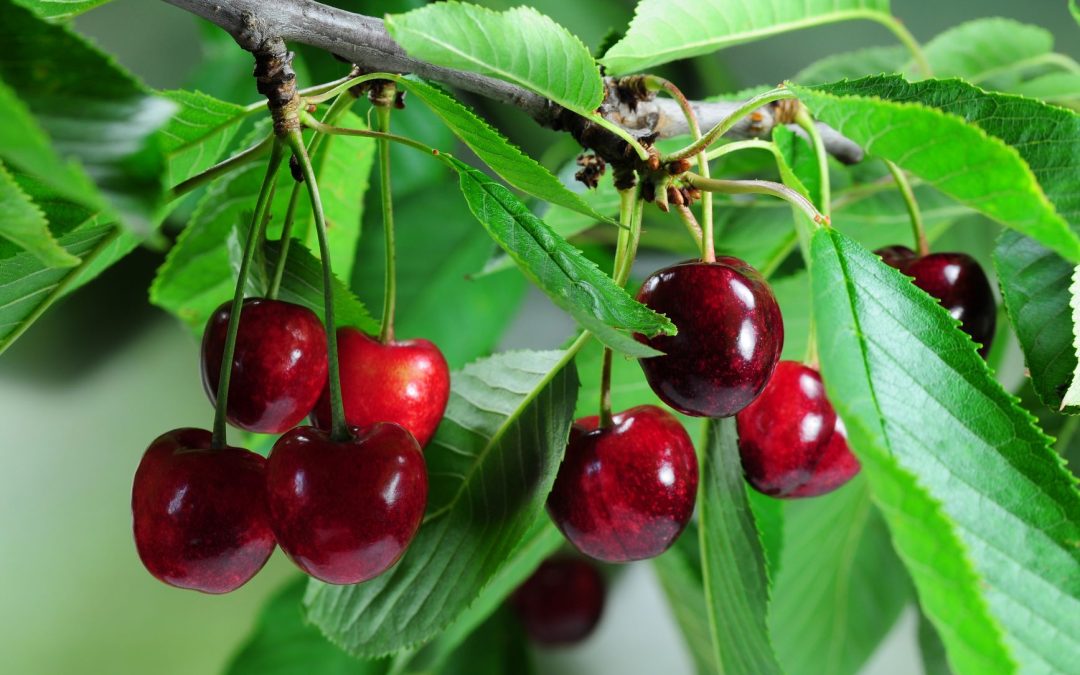Cherry trees are popular for commercial and backyard gardens, providing us with delicious fruit. Think cherry smoothie, cherry pie and homemade cherry ice cream. When ripe, they are great to eat right off the tree. Just give them a quick but thorough wash with clean water and you have an immediate nutritious snack. They also make a valuable crop for commercial purposes and BC is responsible for 95% of Canada’s export crop. Mature trees can produce 150 to 300 pounds of cherries, enough for an entire family, with probably a few pounds left over for freezing.
General Care of Cherry Trees
It’s important to have deep, loose soil for planting cherry trees, so if your soil is packed with clay, dig out a bigger space and fill it with compost or garden soil before planting. Their roots need to move out quickly past the frost line, or freezing layer, to survive winter and store sugars in their root system.
These reserves will be pulled up after spring thaw when the tree needs energy to bud. If you’re in the habit of testing soil pH, they like their soil slightly acidic at about 6 to assist in nutrient uptake. Fertilizing your trees won’t help much if the pH of your soil is alkaline. Fertilize early in the spring when the flowers bud, and in the fall. The first year of planting, fertilize to boost your cherry trees out of dormancy with a gentle nitrogen fertilizer 2-0-0 and once they start to blossom, fertilize for growth when the flowers start forming with compost tea or more light fertilizer. In the fall, fertilize with a high phosphorous fertilizer to get the roots ready for dormancy.
Year two, apply a good nitrogen fertilizer for tree health and fruit production. Cherry trees need full sun and adequate watering to produce fruit. Use drip irrigation or water at the base of the tree, as too much water or heavy continuous rainfall can split the fruit. New trees will need more water on the first year of planting for healthy root growth.
Cherry Tree Pests and Spraying
Little Cherry Disease is caused by two viruses spread by the apple mealybug and transmitted by propagation. Symptoms are variable but include flat tasting small fruit that does not ripen fully. Insects that can ruin cherries include the ambrosia beetle, black cherry aphid, cherry fruit flies and green fruit worms. Call us to discuss your options on spraying cherry and other fruit trees. Spraying is part of our maintenance program and depending on where you live in the province, may be necessary to comply with bylaws that protect commercial fruit crops.
QUICK FACTS
Cherries are exported from the west coast by cargo ships or flown to Asia and Europe in refrigerated containers.
Currently, there is more export demand than supply, and 95% of Canada’s cherries are grown in BC.
Approximately 3,500 acres of cherry orchards are planted in BC.
The cherry harvest begins in June although the majority of our cherries are harvested in August.
The price of cherries relies on supply vs. demand.
Weather factors into the success of cherry crops, as fruit and tree health are affected by rain and cold weather.
Your cherry trees need to be healthy in order to produce fruit, and one way to maintain tree health is by proper pruning, fertilization and spraying. Professional pruning is an absolute “must” to maintain the health of trees and assist in fruit production. Contact us for a friendly consultation on how to take care of your fruit trees. Our professional arborist services protect against infestations, and boost health, growth and productivity.

